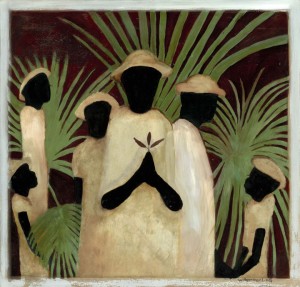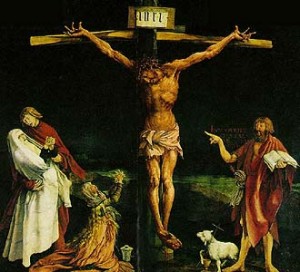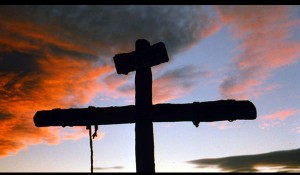Philippians 3:4b-14
Who are you?
Who are you?
How do you define yourself?
When I was a child, back in the ‘60s (and yes, I’m telling you my age now) we used to define ourselves by our ethnicity … who was Irish, who was Italian, who was French, who was English. And while we might have been nice about the terms we used to define ourselves, we certainly were not nice when it came to defining others.
By the time I was 7, I think I knew every derogatory term out there. You name an ethnicity, and I knew the name.
And I used it.
Because that’s what we did in those days.
We used names – horrible names – to define each other.
I am one-half French, one-quarter Irish and one-quarter Russian. I got called names right along with the rest of my friends.
And I thought that was normal. Because that’s the way the world was in those days …
Thankfully, the world has changed somewhat in the last 40 years, to the point where a lot of the youths I know don’t even know what those derogatory names mean, much less use them.
Which is a good thing on every level, I admit, but in the long run, it turns out those names never meant a thing anyway.
Because those names? They don’t define us. Our ethnic heritage, like so many other attributes of our lives, is nothing more than an accident of nature.
What defines us … the only thing that defines us … is that we are beloved children of God, created in God’s image, called into being by God’s love for us … for each of us.
Everything else?
Whether we’re tall or short, black or white or Latino or Asian, blue-eyed or brown-eyed? The countries we come from? The countries our ancestors came from?
They don’t mean a thing.
Because they really are but accidents of nature.
Think about it: You don’t get to choose where you are born. You don’t get to choose the color of your skin or your eyes or your hair. Where your parents came from? You have no say in that. So these things … which so often seem so important to us … really do not define us.
What defines us … what really defines us … is that we are beloved children of God.
This is what Paul is trying to teach us this morning in his letter to the Philippians.
He is writing to a community – a new community – in Philippi, a city filled with people from all over the world, with Roman citizens and slaves, with Greeks and Romans and Jews and Africans and any other nationality you can think of. In that community, you kept to your own, as it were. Sometimes, your own was defined by your faith or ethnicity. More commonly, it was defined by your trade … so stone-layers belonged to an association of stone-builders. Tent-makers hung out with tent-makers. Each form of labor had an association of some kind, and that association was your community.
But the community to which Paul was writing was breaking those boundaries. Tent-makers and stone-layers and everyone else was all mixed together in this new community of Christ followers, this community that broke all the boundaries that normally fenced the people in in those days: boundaries of race and religion and work and citizenship.
Paul is telling the Philippians that it was OK to cross those boundaries, because they didn’t define the people any more. What defined them, Paul says, is their faith in Christ Jesus, which taught them, as they had never been taught before, that each of them was a beloved child of God.
To make sure that the Philippians understand this idea of radically realigning their lives, of radically and dangerously going against the grain that Roman society demanded, Paul lays out his own credentials first. He was, he says:
• “Circumcised on the eighth day” – meaning according to the Law, meaning, he came from a Law-abiding family.
• “A member of the people of Israel, of the tribe of Benjamin” – meaning that he was descended from Benjamin, Jacob’s youngest son, meaning that Paul’s parents were not some Johnny-come-lately Jews, but were descended from a long and faithful line of Jews.
• “A Hebrew born of Hebrews” – again, Paul was not a convert. He was born into the faith.
• “A Pharisee” – meaning that not only had he studied the Law with the very best teachers, but he could interpret the Law and then tell you how it applied to you.
• “A persecutor of the church” – remember, this is Paul, who once was Saul, who stood by and held the coats of the men who stoned Stephen, the first deacon to be martyred. This is Paul, who once was Saul, who was on that road to Damascus precisely so he could arrest these Christians and haul them back to Jerusalem to be tried, found guilty and stoned to death just like Stephen.
• “As to righteousness under the law, blameless” – This is Paul at his arrogant best: I knew I was in right relationship with God.
Paul is explaining that he knew exactly who he was, defining himself through worldly standards (and yes, even the Law was, in Paul’s estimation, a worldly standard). And he was darned proud of who he was in the world.
But now, he says, now … all those definitions are gone. They no longer matter.
Because now, he says, he defines himself solely as belonging to Christ, he names himself a beloved child of God, saved through Christ, obedient to Christ, following Christ, every moment of every day.
Those old definitions? he asks.
They are nothing but rubbish. Garbage. Basura.
Because Paul knows, to the core of his being, that he belongs to God, and he defines his belonging through Jesus Christ.
The truth is, we are just like Paul.
Like him, we have been asked to give up our past – glorious or desperate, it matters not – asked to give up our worldly identities so that we can find, so that Christ can define us.
Everything in the past? Not important.
Because our future lies in the future, with God.
Now imagine what our world would look like if we took this definition to heart, if we really defined ourselves in this way.
How would we treat ourselves? What would it feel like to know that the single most important part of our identity is being the beloved?
Defining ourselves in God means that we accept people for who they are – beloved children of God – and then we act as though everyone – everyone – actually is a beloved child of God.
Imagine what the world would look like if we actually lived this way. If we actually dared to be as bold as Paul, to define ourselves not by the world’s standards, but by God’s standards, and then acted that way?
I can tell you what happens: The world looks at us and says, “You can’t do this. You’re a dreamer. You’re a fool.”
But what the world has to say about this is not important, because the world doesn’t get to make those decisions. God does!
And God, who created us all in God’s image, declares that all of us belong, that all of us are equal, that all of us are beloved.
So let’s do this:
Let’s be radical go out into the world today – and every day after today – and let’s live as the people we truly are: God’s.
And let’s treat everyone else as the people they truly are: God’s.
This is the greatest gift we can give to the world: To stop defining ourselves by accidents of nature and start defining ourselves by the only thing that matters:
We are beloved children of God.
Full stop.
Amen.
Sermon preached on the 16th Sunday after Pentecost at St. Paul’s Episcopal Church, Bailey’s Crossroads, Va., Proper 22, Year A, 2 October 2011.








